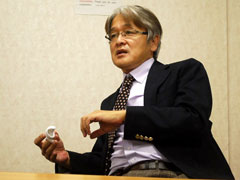
Name: Kinya SHIMIZU
Affiliation: Professor, Graduate School of Humanities and Social Sciences, Hiroshima University
Areas of research: Social sciences/Pedagogy/ Curriculum studies
Professor Kinya SHIMIZU, who is teaching science education at Hiroshima University, plays a central role in accepting international students. We asked him about the current situation of international students and the significance of studying in Japan at a time when there is an ongoing impact of the COVID-19 pandemic.
As of 2020, when the COVID-19 pandemic has made it difficult for those abroad to enter Japan, international students at Hiroshima University are taking online classes using Microsoft Teams. Professor Shimizu explains that the university provides flexible study options: "If you are located in Africa or a region in a different time zone, planning to take classes there before coming to Japan, we can arrange the schedule so that you can easily do so, for example, by arranging the seminar to start in the evening."
Since there are fewer COVID-19 cases in Hiroshima compared to bigger cities like Tokyo, Hiroshima University can also offer in-person classes by taking general infection prevention measures, such as avoiding the "Three Cs: Closed spaces, Crowded places and Close-contact settings" and making masks mandatory (as of November 2020). International students who are planning to join the JICA Development Studies Program (JICA-DSP) will spend two weeks in quarantine at a JICA facility after arrival in Japan. After this, "they should be able to enjoy life at Hiroshima University without problems if they take proper measures against infection," says Professor Shimizu.
Professor Shimizu emphasizes experimentation and observation in science education. To perform experiments and observations, it is necessary to use your hands and think for yourself. The professor explains, "In developing countries, even instructors are often used to taking everything they learned for granted without developing the habit of thinking for themselves." The main advantage of coming to Japan is to be able to see how experiments and observations are made right before your eyes and to learn while practicing them in real life. "Learning online using video materials is one possibility, but I would like you to experience it firsthand as much as possible."
There is another advantage of taking up science education in Japan. First, Japanese curriculum is designed logically. The curriculum for each grade is designed in such a way that children can develop step-by-step thinking skills. According to Professor Shimizu, many other countries do not have this idea of cumulative learning. In Japanese education, sciences are used to solve real-life problems. "Japanese science education starts with concrete examples, helping students to think for themselves about why things are as they are and examine them through experimentation and observation with their own hands."
Accepting international students affects Japanese people in various ways. "Conducting experiments together will allow Japanese and international students to learn the differences in their thought processes and broaden their perspectives. Some Japanese students choose Hiroshima University as they are attracted to the environment in which they can learn together with international students," says Professor Shimizu. It is also significant for students to be able to picture the faces of their acquaintances whenever they hear news from abroad, without forming stereotypical images. "I believe you can have a down-to-earth discussion only if you have face-to-face interaction."
What should Japanese society be aware of when accepting international students? Professor Shimizu thinks that language is key: "It seems to me that most conflicts with foreign people arise from communication difficulties. Learning a language means accepting a culture. Japanese people should be encouraged to cooperate with international students as Japanese-language volunteers to lower the barrier between them."